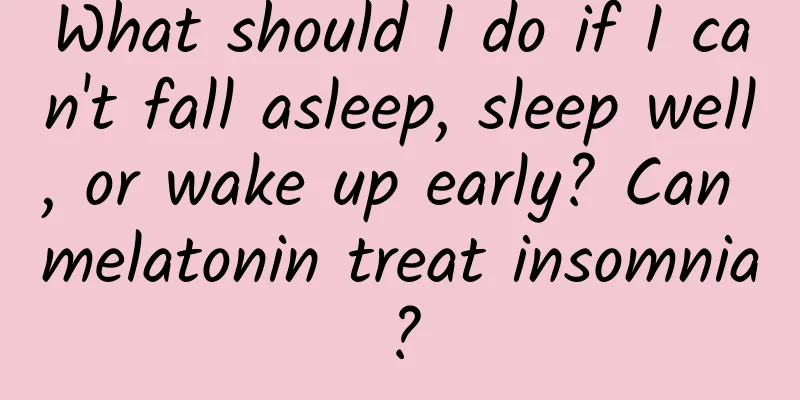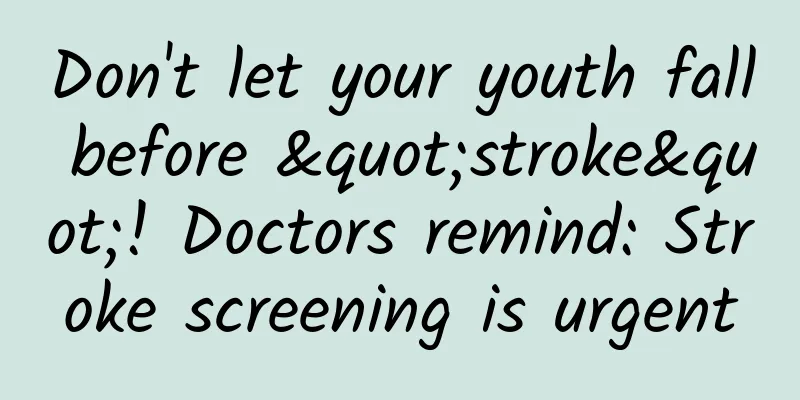What should I do if I can't fall asleep, sleep well, or wake up early? Can melatonin treat insomnia?

|
Author: Si Tianmei, Chief Physician, Peking University Sixth Hospital Standing Committee Member of the Chinese Medical Association Psychiatry Branch Reviewer: Tang Qin, Director of the Science Department of the Chinese Medical Association Nowadays, there are many young people with sleep problems, and a large number of people suffer from insomnia, but the situation actually varies in severity. From a narrow perspective, insomnia means being unable to sleep, but in fact insomnia includes many other situations, such as being unable to sleep, sleeping poorly, and waking up early. Figure 1 Original copyright image, no permission to reprint The entire sleep process can be divided into early sleep, middle sleep and final sleep. Problems with early sleep usually manifest as difficulty falling asleep; problems with middle sleep manifest as difficulty maintaining sleep, such as dreaming and waking up easily; problems with final sleep manifest as waking up early. There is another situation that you fall asleep at night and sleep enough, but when you wake up in the morning, you still feel tired and exhausted, as if you have not slept all night. This is a sense of sleep deprivation. No matter which of the above sleep periods has problems, it can be used as a basis for the diagnosis of insomnia. If insomnia occurs at least 3 days a week and the symptoms persist for more than one month, it can be clinically diagnosed as insomnia. 1. What should I do if I suffer from insomnia? Exercise is a good non-drug treatment for insomnia. A certain amount of exercise and a regular life can help you sleep. Pay attention to sleep hygiene, have a regular life, go to bed on time, and get up on time. Psychotherapy is also an effective treatment for sleep disorders. If the above methods cannot solve the problem, sedative hypnotic drugs can be used to relieve insomnia. Sleep has a rhythmic nature. When sleep disorders occur, it is actually because the individual's sleep rhythm has been disrupted. With the help of drugs, the sleep pattern can be rebuilt, and then the drugs can be gradually reduced and stopped. At the same time, attention should be paid to sleep hygiene, and healthy living habits and exercise habits should be maintained to restore and maintain a normal sleep rhythm. Figure 2 Original copyright image, no permission to reprint Generally speaking, most people can restore their normal sleep rhythm through self-adjustment and medication. 2. What types of sleeping pills are there? Sleeping pills, as the name suggests, are drugs that can help you sleep and have a good sleep. There are currently three types of sleeping pills. Barbiturates were the earliest drugs used for sedatives and tranquilizers, including amobarbital, secobarbital, etc. They have sedative and hypnotic effects and were used in the clinical treatment of insomnia and sleep disorders in 1903. Barbiturates mainly act on the neurotransmitter called γ-aminobutyric acid in the brain, directly stimulating γ-aminobutyric acid receptors. The therapeutic window is narrow, and when the dose is increased, it may cause respiratory depression or even respiratory arrest. Since the 1960s, barbiturates have no longer been used for sedation and hypnosis, but mainly for auxiliary use in anesthesia and treatment of withdrawal symptoms of alcohol dependence. The second class of drugs is benzodiazepine receptor agonists, including benzodiazepine receptor non-selective agonists and selective receptor agonists. There are forty or fifty types of benzodiazepine receptor non-selective agonist drugs, commonly known as tranquilizers, commonly used in clinical practice, such as triazolam, alprazolam, estazolam, midazolam, lorazepam, oxazepam, clonazepam, flurazepam, bromazepam, etc., but less than ten of them are commonly used in China. The targets of benzodiazepines and barbiturates are both γ-aminobutyric acid A receptors. Benzodiazepines exert their therapeutic effects by enhancing the effects of γ-aminobutyric acid, and therefore must rely on γ-aminobutyric acid. If there is no γ-aminobutyric acid or the amount of γ-aminobutyric acid remains stable, then even if the dose of benzodiazepines is increased, it will not increase the effect of γ-aminobutyric acid receptors. Therefore, it is safer than barbiturates. Benzodiazepines may also produce some adverse reactions during use. For example, some patients will develop drug resistance after using them for a period of time, that is, the original dose cannot achieve the initial therapeutic effect, and the dose needs to be gradually increased; and with long-term use of high doses, some individuals may gradually become dependent on the drug. Improper use may also cause other adverse reactions, such as memory impairment. Since the 1970s and 1980s, selective benzodiazepine receptor agonists have been used in clinical practice. They are also called non-benzodiazepine sedatives and hypnotics, such as zolpidem, zopiclone, zaleplon, etc. The third category of drugs includes antihistamines with sedative and hypnotic effects, including some antidepressants, such as mirtazapine and doxepin, and antipsychotic drugs such as quetiapine, which have sedative and hypnotic effects when used in small doses. Are each generation of drugs for treating insomnia better than the previous one? From some perspectives, there are improvements in safety. These drugs are prescription drugs, and doctors need to evaluate and judge the individual's sleep characteristics, severity, and whether there are other diseases, etc., and prescribe drugs according to individual needs. At the same time, the individual must cooperate in exercising and maintaining good sleep hygiene. Many people who can’t sleep choose to take melatonin. Can melatonin cure insomnia? 3. Can melatonin treat insomnia? Everyone's physiological activities have rhythmicity. Melatonin is a neurotransmitter secreted by the pineal gland in the suprachiasmatic nucleus of the brain, which is responsible for regulating biological rhythms. During the day, light stimulates the melatonin receptors located under the retina, inhibiting the secretion of melatonin; at night, when there is no more light stimulation, melatonin begins to be secreted, which can play a good role in promoting sleep. Some individuals whose biological rhythms become disordered and who suffer from mild insomnia can take this type of drug to regulate their rhythms to a certain extent; but for patients with severe or chronic insomnia, melatonin may not meet their needs. The sleep regulation mechanism is very complex. Many problems may cause insomnia, such as excessive stress, mental and psychological changes, some physical diseases or mental disorders. Insomnia may be more like a signal or sign of an imbalance in the body or mental and psychological problems. Individuals who have been diagnosed with primary insomnia by a doctor should go to the hospital for systematic treatment, medication or psychotherapy, or a combination of both. They should avoid taking sedatives and hypnotic drugs at home. The doctor will choose appropriate treatment plans and drugs for the patient based on a systematic examination and evaluation of the individual and scientific judgment. |
>>: I was sent to the ICU after running a marathon. It was not sudden death, but muscle dissolution!
Recommend
Caesarean section incision pain
Pain from the incision is a relatively normal sym...
Can perlite be used to propagate bougainvillea? What soil should be used to propagate bougainvillea?
Bougainvillea is loved by people for its gorgeous...
Tips for relieving severe vomiting during pregnancy
When a married woman experiences symptoms such as...
Do I need to fast for the six hormone tests?
With the improvement of food, clothing, housing a...
What to do if you have pain on both sides of your lower abdomen during your period
Every healthy woman will have a menstrual period ...
What is the most fertile time?
When women are preparing for pregnancy, they shou...
How to treat vulvar itching?
Some women may seem to be glamorous on the surfac...
What is yellow rock sugar made of? What is the difference between yellow rock sugar and single crystal rock sugar?
Rock sugar is composed of glucose containing crys...
Retinal hemorrhage after exercise, why does aerobics still "strain your eyes"?
Has everyone done the “blanket exercise” that has...
How to calculate pregnancy time
Many pregnant women do not know how to calculate ...
Symptoms and causes of uterine enlargement
Uterine enlargement mostly occurs during pregnanc...
Should pregnant women be examined in the morning or afternoon?
Nowadays, medicine is more advanced, and diagnosi...
Are you still doing things that damage your eyes? Let’s take a look at some tips on eye protection!
...
Can I eat peaches when I have my period?
Peach is a nutritious fruit. It contains a lot of...
What are the symptoms of heavy moisture in a woman's body?
The weather seems to be particularly hot in recen...









